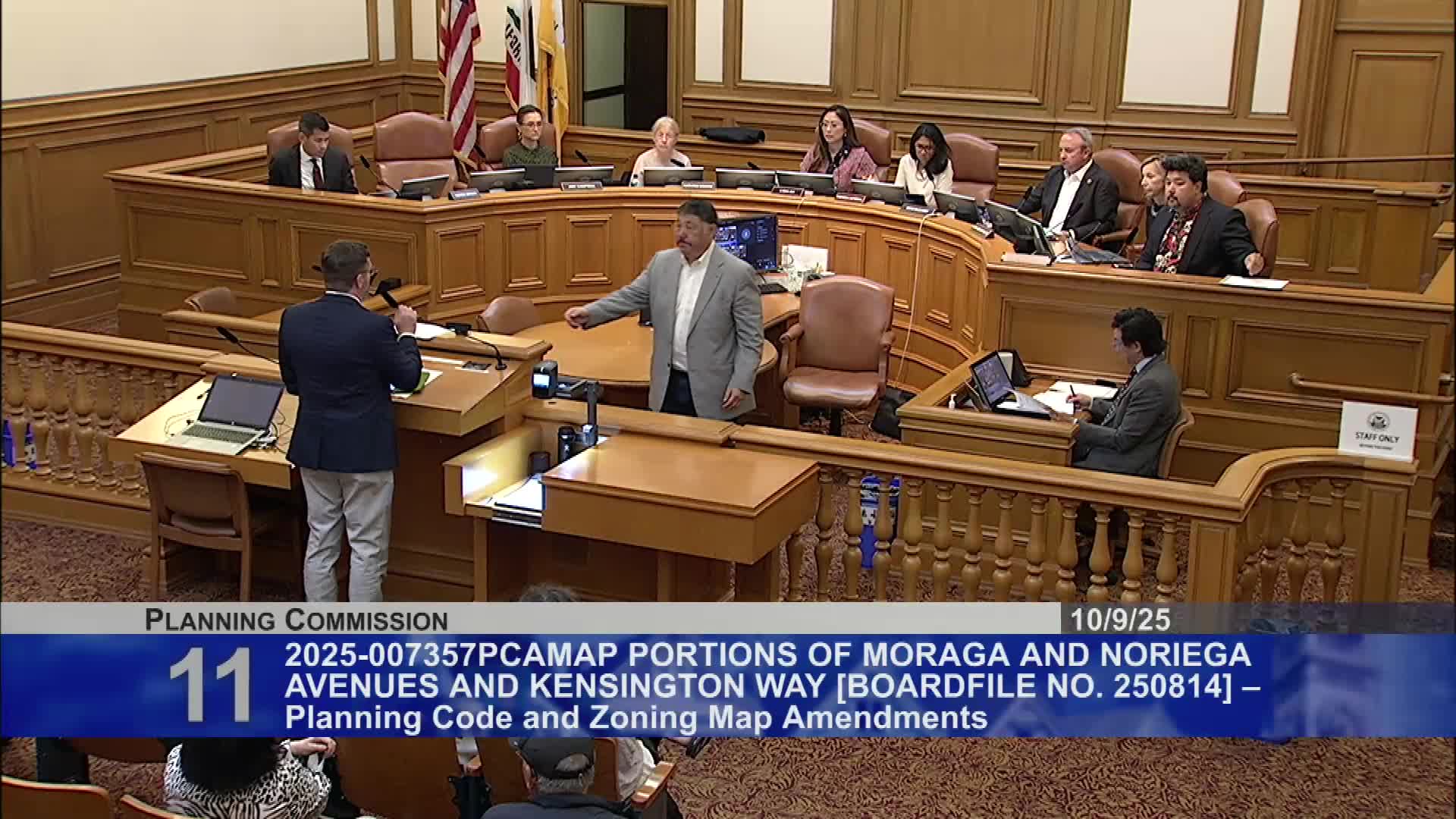Planning Commission backs rezoning to enable Kensington Way land swap and preserve Edge Hill open space
Get AI-powered insights, summaries, and transcripts
Subscribe
Summary
The San Francisco Planning Commission on Oct. 9 recommended approval of a rezoning ordinance tied to a proposed land swap that Supervisor Mirna Melgar said would preserve unstable hillside lots on Edge Hill Mountain as public open space and rezone alternative city parcels for modest housing.
SAN FRANCISCO — The San Francisco Planning Commission on Oct. 9 voted 6–0 to recommend approval of a rezoning ordinance tied to a proposed land swap that Supervisor Mirna Melgar said would permanently preserve unstable hillside lots on Edge Hill Mountain while enabling modest residential development on more suitable, city‑owned parcels.
Supervisor Mirna Melgar (D7), who sponsored the swap, told the commission, “This item before you is a land swap and an ensuing rezoning of the land that we are swapping.” The commission’s action was limited to the rezoning; the land‑swap agreement and any future building proposals will require separate approvals by the Board of Supervisors, state reviewers and project‑level permits.
Commission staff said the ordinance would remove portions of two paper (unbuilt) streets from the zoning map, rezone a city parcel identified in the staff packet (assessor’s parcel noted in the record as 2042039 To 041) from public open space to RH‑2/40X, and in other places rezone parcels to public open space. The Department of Real Estate said appraisals were prepared to support a fair‑market exchange and that state procedures governing disposition of public land — including required appraisals and HCD review in this case — have been followed.
Neighbors and geologists urged caution and asked for more technical review. Jerry Dratler, who submitted handouts and a presentation, asked, “Is the 3,600,000.0 the city spent to acquire lots with unstable soil that are prone to landslide a prudent use of $3,600,000?” Several residents cited a history of slope failure on Edge Hill and the 1989 Loma Prieta earthquake’s damage to Eighth Avenue properties.
Professional geologist George Burwasser described the site’s bedrock and ecological value, telling the commission, “The proposed public open space area on this flank of Edge Hill Mountain is not just another steep hill in a city of hills. The exposure there of contorted and fractured Franciscan formation bedrock illustrates important phases of the geologic and structural history of San Francisco.” Other speakers, including neighbors along Moraga, Noriega and Eighth Avenue, described visible settling behind retaining walls and raised questions about access to downslope parcels and the long‑term capacity of the existing retaining structures.
Department staff and the Department of Real Estate emphasized that the commission’s role at this hearing was to consider rezoning only. Sally Orth, director of the Department of Real Estate, said the department’s review focused on fair market value, appraisals and adherence to board‑level processes. Planning staff and the supervisor reiterated that buildability and life‑safety for any future project would be assessed at the building permit and project approval stage, and that state law (including the surplus‑land/land‑disposition rules and HCD review) adds further steps before a swap and any development can proceed.
Commission deliberations reflected the distinction between rezoning and project approvals. Commissioner Braun said the rezoning “matches all the other zoning on the surrounding properties” and observed that any future project would be required to submit geotechnical analyses and go through the full permitting process. Commissioner Vice President Moore said she was “on the fence” because the background materials did not fully explain the project’s technical underpinnings and she would have preferred more data in advance.
Action taken: Commissioner McGarry moved to adopt a recommendation for approval of the rezoning ordinance; the motion was seconded and passed unanimously 6–0 (ayes: Campbell, McGarry, Braun, Imperial, Moore, President Soh). The record, including staff presentations and public testimony, notes that the ordinance facilitates a land exchange intended to preserve environmentally sensitive hillside lots and enable housing on parcels the city identified as more suitable.
What the commission did not approve: The vote did not approve the land swap agreement itself, any project plans, or any demolition or construction. Any future development on rezoned parcels will require project‑level approvals, environmental review where applicable, detailed geotechnical reports, and required state and board reviews.
Next steps: If the Board of Supervisors approves the land‑swap agreement later in the process, HCD and other state reviews will remain part of the legal checklist, and any developer proposing construction will need to submit geotechnical studies and comply with current building codes and permit review. Neighbors and some commissioners asked the supervisor’s office and planning staff to provide clearer technical summaries to the community before and during subsequent steps.
